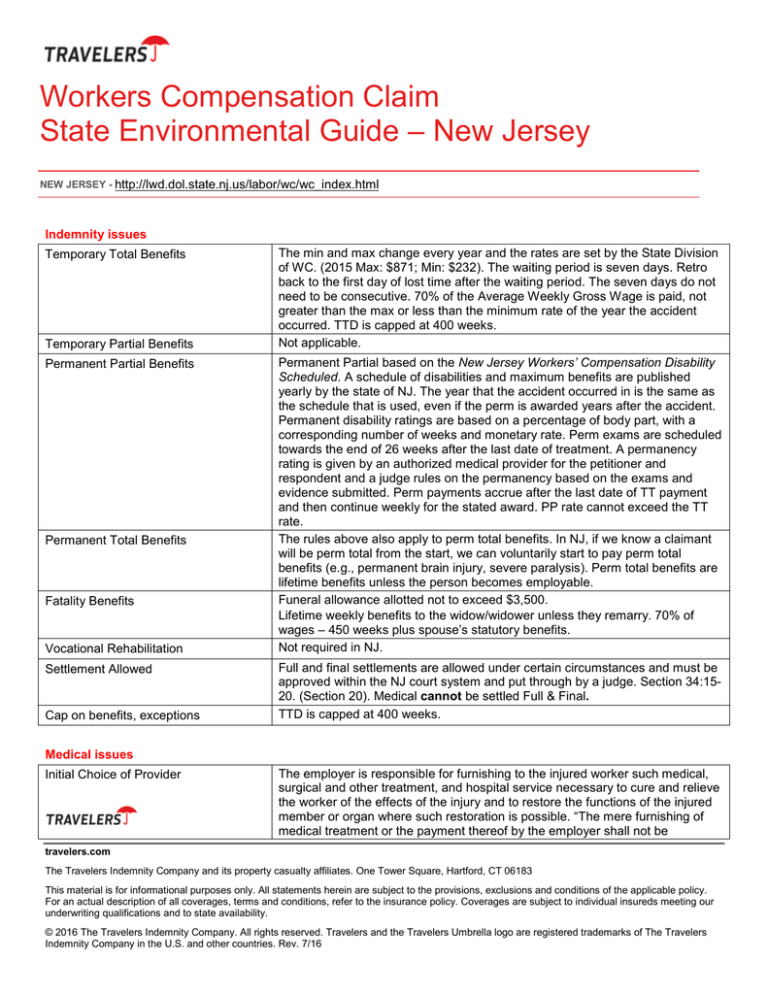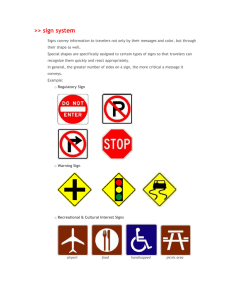
Workers Compensation Claim
State Environmental Guide – New Jersey
NEW JERSEY - http://lwd.dol.state.nj.us/labor/wc/wc_index.html
Indemnity issues
Temporary Total Benefits
Temporary Partial Benefits
Permanent Partial Benefits
Permanent Total Benefits
Fatality Benefits
Vocational Rehabilitation
Settlement Allowed
Cap on benefits, exceptions
The min and max change every year and the rates are set by the State Division
of WC. (2015 Max: $871; Min: $232). The waiting period is seven days. Retro
back to the first day of lost time after the waiting period. The seven days do not
need to be consecutive. 70% of the Average Weekly Gross Wage is paid, not
greater than the max or less than the minimum rate of the year the accident
occurred. TTD is capped at 400 weeks.
Not applicable.
Permanent Partial based on the New Jersey Workers’ Compensation Disability
Scheduled. A schedule of disabilities and maximum benefits are published
yearly by the state of NJ. The year that the accident occurred in is the same as
the schedule that is used, even if the perm is awarded years after the accident.
Permanent disability ratings are based on a percentage of body part, with a
corresponding number of weeks and monetary rate. Perm exams are scheduled
towards the end of 26 weeks after the last date of treatment. A permanency
rating is given by an authorized medical provider for the petitioner and
respondent and a judge rules on the permanency based on the exams and
evidence submitted. Perm payments accrue after the last date of TT payment
and then continue weekly for the stated award. PP rate cannot exceed the TT
rate.
The rules above also apply to perm total benefits. In NJ, if we know a claimant
will be perm total from the start, we can voluntarily start to pay perm total
benefits (e.g., permanent brain injury, severe paralysis). Perm total benefits are
lifetime benefits unless the person becomes employable.
Funeral allowance allotted not to exceed $3,500.
Lifetime weekly benefits to the widow/widower unless they remarry. 70% of
wages – 450 weeks plus spouse’s statutory benefits.
Not required in NJ.
Full and final settlements are allowed under certain circumstances and must be
approved within the NJ court system and put through by a judge. Section 34:1520. (Section 20). Medical cannot be settled Full & Final.
TTD is capped at 400 weeks.
Medical issues
Initial Choice of Provider
The employer is responsible for furnishing to the injured worker such medical,
surgical and other treatment, and hospital service necessary to cure and relieve
the worker of the effects of the injury and to restore the functions of the injured
member or organ where such restoration is possible. “The mere furnishing of
medical treatment or the payment thereof by the employer shall not be
travelers.com
The Travelers Indemnity Company and its property casualty affiliates. One Tower Square, Hartford, CT 06183
This material is for informational purposes only. All statements herein are subject to the provisions, exclusions and conditions of the applicable policy.
For an actual description of all coverages, terms and conditions, refer to the insurance policy. Coverages are subject to individual insureds meeting our
underwriting qualifications and to state availability.
© 2016 The Travelers Indemnity Company. All rights reserved. Travelers and the Travelers Umbrella logo are registered trademarks of The Travelers
Indemnity Company in the U.S. and other countries. Rev. 7/16
New Jersey Workers Compensation Claim State Environmental Guide
Medical issues
Change of Provider
Medical Fee Schedule
Managed Care
Utilization Review
Treatment Guidelines
Generic Drug Substitution
Medical Mileage Reimbursement Rate
Network Information
Ability to Terminate Medical Treatment
Settlement Allowed
Cap on benefits, exceptions
construed to be an admission of liability.” (Sec. 34:15-15).
The insurance company acts on behalf of the employer and usually takes over
medical management once notice of the claim has been received. The
employer/insurer can change the provider without restriction. Where the
employee is not satisfied with the level of care, a motion for medical treatment
may be filed.
No medical fee schedule in NJ. Reasonable and customary is applied.
Insurers may use an approved managed care program to provide medical
services. Managed care programs approved by the Department of Insurance.
Comprehensive description of certification requirements to be found in New
Jersey Administrative Code Title 8 Chapter 38. Subchapter 2.2
Utilization Review is performed by registered nurses on all treatment requests
including hospital admission, surgery, DME, therapies, diagnostic tests.
Prospective and Concurrent Reviews are completed to determine medical
appropriateness and/or length of treatment. Claim case managers can decide to
opt out of utilization review to obtain a second opinion.
Travelers’ position papers and Genex’s Clinical Guideline tools (CGTs) are
used. Managed care arrangements must develop plan treatment protocols
before plan can be certified.
The state does not mandate generic substitution.
Mileage is not reimbursed. Transportation can be provided if medically
necessary.
Coventry Integrated Network (primary) and CorVel (secondary).
Medical benefits are paid until the claimant has concluded treatment or until
MMI is reached. Medical cannot be settled Full & Final.
Full and final settlements are allowed under N.J.S.A. 34:15-20 (Section 20) in
certain limited circumstances and are subject to the approval of the Judge
within the Division of Workers’ Compensation assigned to the case. Settlements
under Section 20 will extinguish certain rights of the claimant on a full and final
basis, including the right to seek further compensation or additional medical
treatment.
When the claimant has reached Maximum Medical Improvement or no further
medical treatment is necessary as authorized by the treating physician. Or
when an Independent Medical Exam or IME states that claimant is MMI and no
further medical treatment is necessary. If an IW has RTW, TT benefits cease,
medical would continue until MMI.
Other Issues
Staff Counsel
Hearings require attorney or
claim handler participation
Occupational Diseases
Second Injury Fund availability
WC Reference
Law Offices of William E. Staehle
Suite 200
445 South Street
Morristown NJ 07960
Attorney for hearing or trial. Claim professionals can also authorize settlement
up to a certain monetary amount. Outcome of hearings – Pro Employee
Cumulative trauma is recognized. All prior carriers are brought in. The last
carrier usually gets the brunt of the case unless there was a medical exam
proving manifestation or prior treatment for the injury alleged.
SIF is available in NJ. To be eligible for Fund benefits, an individual must be
totally and permanently disabled as the direct result of a work-related injury in
combination with a pre-existing permanent partial disability. It is not necessary
that the pre-existing permanent partial disability be work-related.
2
Rev. 7/16
New Jersey Workers Compensation Claim State Environmental Guide
Other Issues
Other Offset Opportunities
Social Security offset, Second Injury Fund, Credit for Prior Awards or Abdullah
EDI
Claims EDI Release 3: FROI & SROI (7/9/2012)
In-State Adjusting Required
No.
License or Certification Required
No license or certification required.
WC Hearing Docket Speed
Listings are by cycle. One cycle equals 3 weeks. Case can be put off by any
number of cycles. Numerous Judges of Compensation have tendered
retirement in the past 18 months. New Judges are much less effective at
moving pending caseloads, thereby leading to backlogs of open cases. First
listings of matters in certain venues (Union, Newark), often delayed by 6 months
or more.
WC Reference
3
Rev. 7/16

